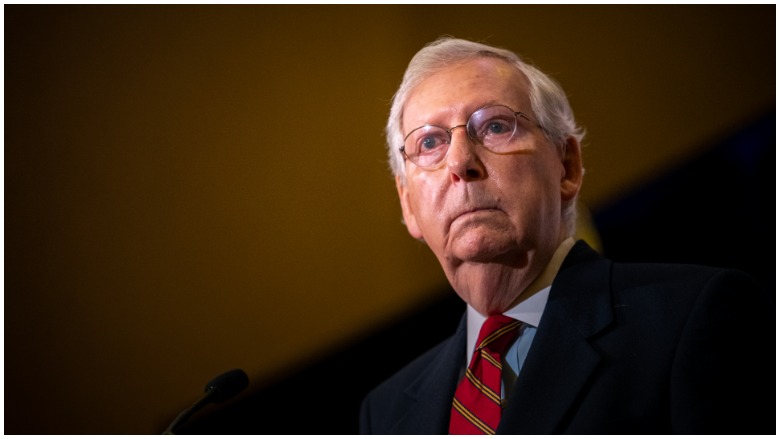
Getty Senate Majority Leader Mitch McConnell.
Senate Majority Leader Mitch McConnell, fresh off a win to retain his Kentucky senate seat from challenger Amy McGrath, is expected to take over negotiations for a new coronavirus relief measure.
McConnell has made it clear that his intent is to develop a “targeted” and less costly bill, which has received pushback from main Democratic negotiator and House Speaker Nancy Pelosi. The two publically clashed when McConnell suggested that targeted approach and Pelosi said, according to The Hill, “That isn’t anything that we should even be looking at.”
You can read more about the big five elements Democrats and Republicans have been fighting to keep in — and out — of the next stimulus package here.
McConnell, however, has given many reasons for why he wants a “skinny bill,” including deficit spending and reducing/eliminating some of the more costly elements present in the Democrats’ updated HEROES Act, such as continued unemployment supplements and aiding state and local governments.
McConnell Has Said He Is Worried About Increasing the Country’s Deficit
The New York Times reported that Republicans have traditionally disliked stimulus packages and they refused to support the $825 billion stimulus package President Barack Obama proposed in 2009 in the wake of the economic recession.
After the initial CARES Act passed, McConnell expressed reticence on another package aimed at reducing the virus, according to Politico. “You’ve seen the talk from both sides about acting, but my goal from the beginning of this, given the extraordinary numbers that we’re racking up to the national debt, is that we need to be as cautious as we can be,” he said.
Despite McConnell’s vocal advocacy for keeping the national deficit low, he has voted for some of the most deficit-increasing policies, such as Trump’s Tax Cuts and Job Act, which increased the national debt by $1.9 trillion, according to the Brookings Institution.
An analysis from Duke University’s School of Law found that the U.S. deficit tripled in the 2020 fiscal year, reaching $3.1 trillion and projected to represent 102% of gross domestic product (GDP) for the first time since World War II.
McConnell’s Stance on Continued Unemployment Aid Has Shifted
Politico reported that in May, McConnell vowed to end the $600 unemployment supplements at a conference call.
However, he took a softer stance in July, saying, “Wherever this thing settles between the president of the United States and his team that have to sign it into law, and the Democrat — not insignificant minority in the Senate and the majority in the House — is something I’m prepared to support, even if I have some problems with certain parts of it,” according to Reuters.
McConnell has not yet vocally supported that benefit and his hesitance appears to come from the Republican caucus of the Senate. Republican Kansas Senator Pat Roberts told NBC News that he believed the unemployment supplements were “a disincentive to work — to come back to work” and Texas Senator John Cornyn, according to CNBC, said, “We should never pay people not to work.”
Even the main Republican negotiator and Treasury Secretary Steven Mnuchin has said that he found the benefits problematic, telling The Hill that “It just wouldn’t be fair to use taxpayer dollars to pay more people to sit home than they would, working and get a job.”
However, in a “skinny bill” McConnell tried to pass in the Senate, $300 in weekly unemployment supplements was included.
Here Is What Was in McConnell’s ‘Skinny Bill’
The skinny bill notably did not include aid for state and local governments — which McConnell controversially said could declare bankruptcy if they were struggling — or an additional round of stimulus checks, Forbes reported.
Here is what Forbes and Politico reported was in the “skinny bill”:
- Weekly federal unemployment supplements of $300
- $105 billion for schools
- $16 billion for coronavirus testing
- $10 billion for Postal Service
- $15 billion for child care grants
- $20 billion in farm aid
- $500 million for fisheries
- Forgive small business loans up to $150,000
Before the bill’s release, USA Today reported that Pelosi called it an “emaciated bill” containing “poison pills,” which she said was “only intended to help vulnerable Republican Senators by giving them a ‘check the box’ vote to maintain the appearance that they’re not held hostage by their extreme right-wing that doesn’t want to spend a nickel to help people.”
Without Democratic support, the bill failed to become law.
READ NEXT: Stimulus Checks 2: Here’s How 2 Georgia Senate Races Could Change Things
